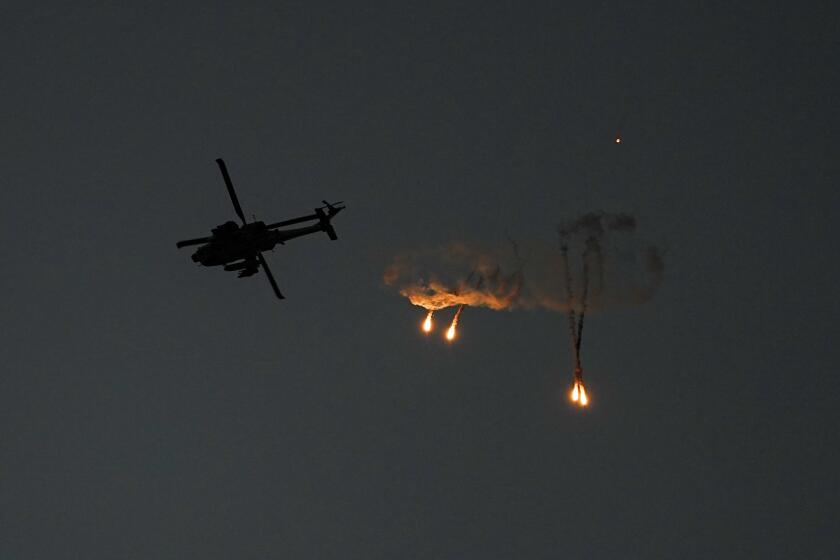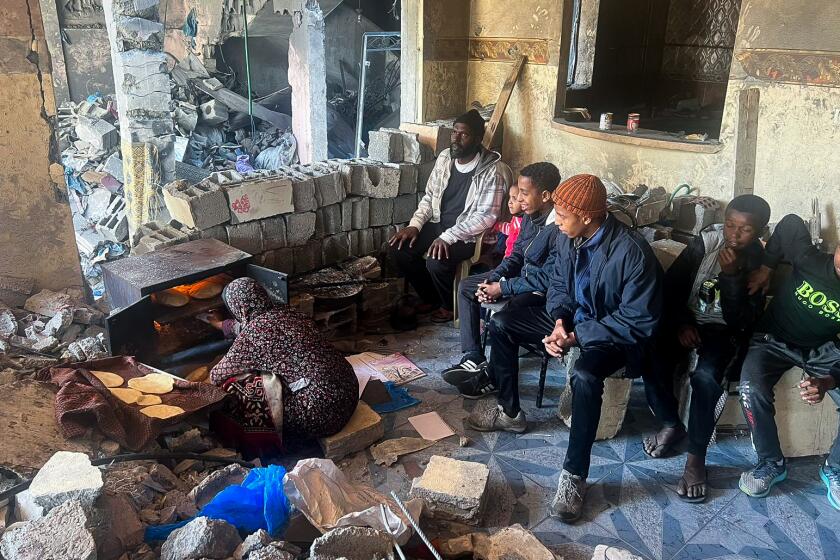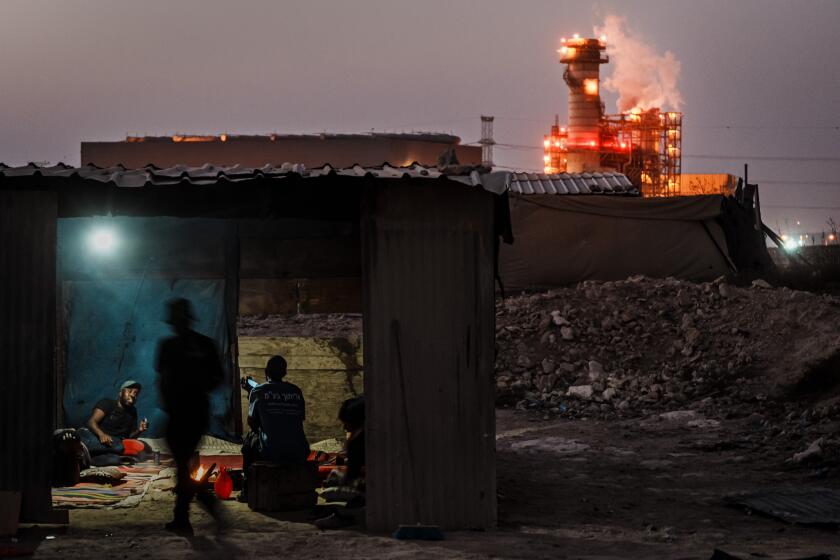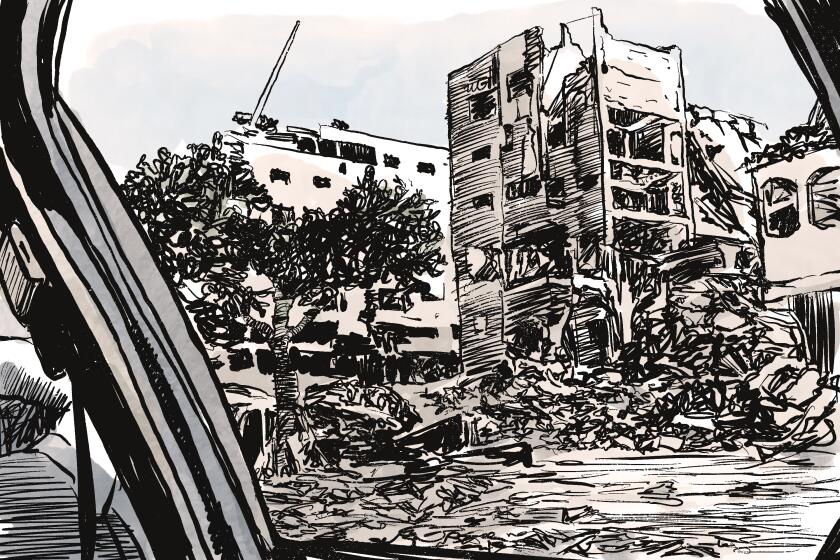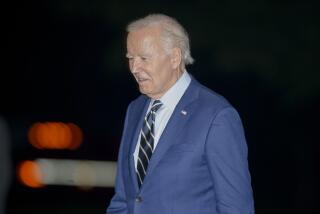Biden takes a tougher stance on Israel’s ‘indiscriminate bombing’ of Gaza
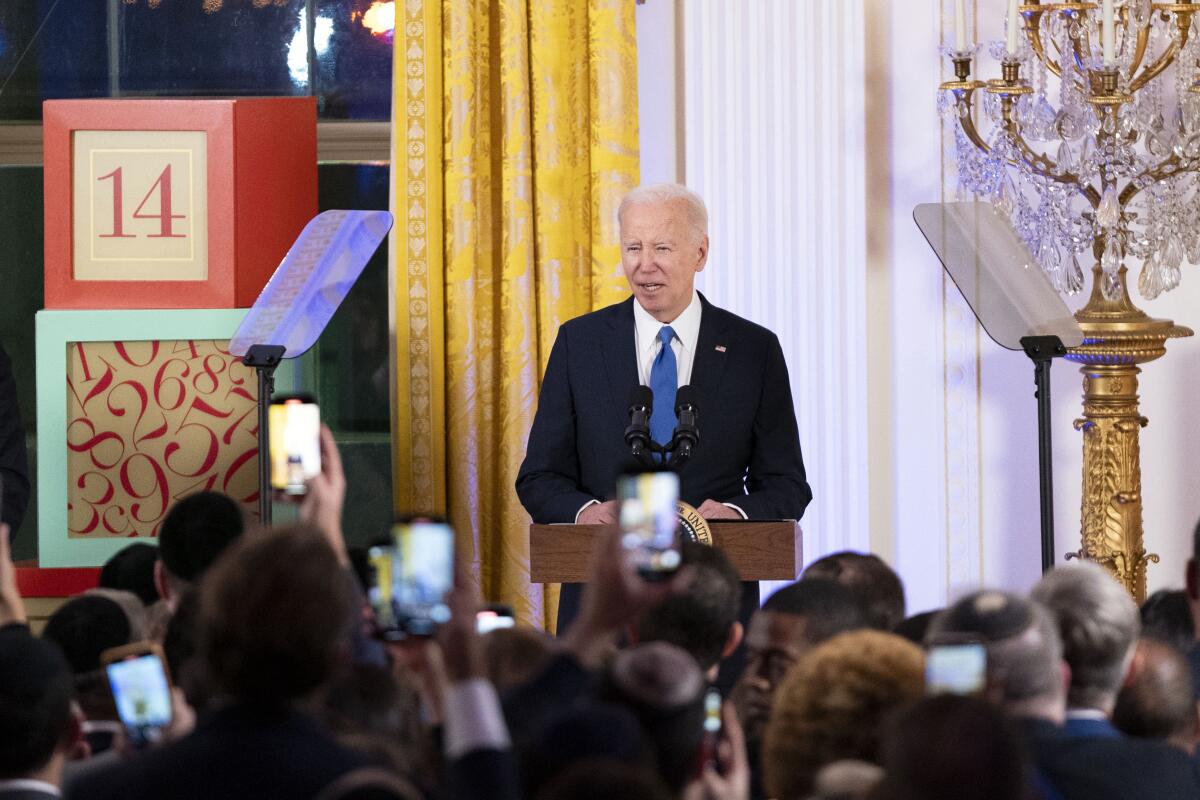
- Share via
WASHINGTON — President Biden on Tuesday warned that Israel was losing international support because of its “indiscriminate bombing” of Gaza, speaking out in unusually strong language just hours before the United Nations demanded a humanitarian cease-fire in the Israel-Hamas war.
“Israel’s security can rest on the United States, but right now it has more than the United States. It has the European Union, it has Europe, it has most of the world supporting them,” Biden said to donors during a fundraiser Tuesday.
“They’re starting to lose that support by indiscriminate bombing that takes place,” he said.
The president said he thought Prime Minister Benjamin Netanyahu understood, but he wasn’t so sure about the Israeli war Cabinet. Israeli forces are carrying out punishing strikes across the Gaza Strip, crushing Palestinians in homes as the military presses ahead with an offensive that officials say could go on for weeks or months.
With Israel and the U.S. showing their sharpest public disagreement yet over the conduct and future of the war against the militant group Hamas, fighting in Gaza raged on Tuesday.
The war ignited by Hamas’ Oct. 7 attack into southern Israel has already brought unprecedented death and destruction to the impoverished coastal enclave, with much of northern Gaza obliterated, more than 18,000 Palestinians killed and over 80% of the population of 2.3 million pushed from their homes.
The healthcare system and humanitarian aid operations have collapsed in large parts of Gaza, and aid workers have warned of starvation and the spread of disease among displaced people in overcrowded shelters and tent camps.
Gaza City and much of the surrounding north have already suffered widespread destruction from more than two months of bombardment. Amid the rubble, Israeli ground troops are still locked in heavy combat with Palestinians fighters, more than six weeks after soldiers invaded the north.
A Times special correspondent in Gaza offers a personal account of living in a place where nowhere feels safe.
Fierce clashes continued Tuesday in Gaza City’s Zeitoun and Shajaiya neighborhoods, as well as in Jabaliya, a densely built urban refugee camp, residents said.
Tens of thousands of Palestinians remain in the north, huddled in homes or in U.N. schools-turned-shelters. As airstrikes and drones smash houses, first responders are unable to reach anyone buried in the wreckage, residents said.
“It was massive,” Mustafa abu Taha, an agricultural worker, said of the sound of gunfire and explosions in Shajaiya, where he lives.
Amal Radwan, a woman sheltering in a school in Jabaliya, said the situation was “catastrophic,” as Israeli troops tried to advance deep into the district and unleashed heavy fire against fighters.
“Whenever the resistance hit them, they hit us very hard. It has become crazy. They strike everywhere with no regard to women or children,” she said.
Outside Gaza City, Israeli troops using a controlled detonation blew up a school run by UNRWA, the U.N. agency for Palestinian refugees, in the northern town of Beit Hanoun. Video posted online showed soldiers cheering as they watched the building collapse in a giant blast and pall of smoke.
UNRWA chief Philippe Lazzarini confirmed the demolition, calling it “outrageous” in a post Tuesday on X, formerly Twitter. There was no immediate comment from the military. On Saturday, it said militants opened fire from inside an UNRWA school in the town.
‘I just don’t know where we’ll go.’ It’s a question Palestinians ask over and over in Gaza as Israel ramps up bombardment after Hamas truce collapsed.
In a briefing with the AP on Monday, Israeli Defense Minister Yoav Gallant signaled that the current phase of heavy ground fighting and airstrikes could stretch on for weeks and that further military activity could continue for months. Netanyahu has said the military will have to keep open-ended security control of Gaza after the war ends.
Biden offered a harder-than-usual assessment of Israel’s decisions since the Oct. 7 attack by Hamas and the moves by its hard-line government. Meanwhile, Biden’s top national security advisor, Jake Sullivan, is heading to Israel this week to consult directly about timetables for ending major combat.
The president also renewed his warnings that Israel should not make the same mistakes of overreaction that the U.S. did after the Sept. 11, 2001, terrorist attacks.
He recounted a familiar anecdote, referring to Netanyahu by a nickname, about inscribing on a photo of them taken decades ago, “Bibi, I don’t agree with a damn thing you have to say.” This time, the president added to his retelling of the story: “That remains to be the case.”
The 2024 campaign fundraiser was part of a gathering of Jewish donors, many of whom attended a White House Hanukkah reception Monday evening; Biden’s fundraisers are open to some reporters on condition that no audio or video be shared.
His rhetoric to donors tracks his more candid and private messaging to Netanyahu on their frequent calls, according to two White House officials, where he reasserts U.S. support for Israel before pushing for Israel to do more to help civilians in Gaza.
“Israel has a tough decision to make. Bibi has a tough decision to make. There’s no question about the need to take on Hamas. There’s no question about that. None. Zero,” Biden said. But he added, of Israel’s leader, “I think he has to change his government. His government in Israel is making it very difficult.”
Bedouins of the Negev desert face rockets from Gaza and discrimination and arrest by Israel. They seek safety as the war energizes the far right.
Biden specifically called out Itamar Ben-Gvir, the leader of a far-right Israeli party and the minister of national security in Netanyahu’s governing coalition, who opposes a two-state solution and has called for Israel to reassert control over all of the West Bank and Gaza. Ben-Gvir sits on Israel’s security Cabinet but is not a member of the country’s three-person war Cabinet.
The comments prompted responses from both the Israeli military and also Hamas.
“We know to explain exactly how we operate with precision, based on intelligence, even when we are operating on the ground,” said Israeli military spokesperson Daniel Hagari. “We know how to operate against the Hamas strongholds in such a way that best separates the uninvolved civilians from terrorism targets.”
Asked about Biden’s comments, a senior Hamas official said in Beirut that “the resistance and the steadfastness of the Palestinian people have made Biden understand that the Israeli military operation is a crazy act.”
“The repercussions [of the war] will be catastrophic on the entity [Israel] and on the results of elections in which Biden might lose his seat in the White House,” Osama Hamdan, a member of Hamas’ political bureau, said during a news conference.
During the fundraiser, Biden said that when he has warned Netanyahu of a loss of international support over the bombing, the Israeli leader has mentioned that the U.S. had “carpet-bombed Germany” in World War II and dropped the atomic bomb on Japan.
“That’s why all these institutions were set up after World War II, to see that it didn’t happen again,” he said. “Don’t make the same mistakes we made in 9/11. There’s no reason we had to be in a war in Afghanistan. There’s no reason we had to do so many things that we did.”
Since Israel’s siege and bombing campaign on Gaza started after Hamas’ Oct 7 attack, the humanitarian situation on the ground has become disastrous.
The U.N. General Assembly voted Tuesday on a nonbinding resolution demanding an immediate humanitarian cease-fire, days after the U.S. vetoed a similar measure at the Security Council. The U.K. abstained from that 13-1 vote, but France and Japan were among those supporting the call for a cease-fire. Only Security Council resolutions are legally binding under the terms of the international body’s charter, but the vote Tuesday sent a strong message on how the conflict was viewed around the world.
Before Biden’s comments at the fundraiser, Netanyahu said in a statement that he appreciated American support and that he’d received “full backing for the ground incursion and blocking the international pressure to stop the war.”
“Yes, there is disagreement about ‘the day after Hamas’ and I hope that we will reach agreement here as well. I would like to clarify my position: I will not allow Israel to repeat the mistake of Oslo. Gaza will be neither Hamastan nor Fatahstan.”
Speaking at a forum hosted by the Wall Street Journal before either leader’s comments, Sullivan reiterated the Biden administration’s position that it does not want to see Israel reoccupy Gaza or further shrink the already small Palestinian territory.
The U.S. has repeatedly called for a return of the internationally recognized Palestinian Authority and the resumption of peace talks aimed at establishing a Palestinian state alongside Israel. Sullivan said he would also speak to Netanyahu about his recent comments that the Israel Defense Forces would maintain open-ended security control of Gaza after the war ends.
“I will have the opportunity to talk to Prime Minister Netanyahu about what exactly he has in mind with that comment, because that can be interpreted in a number of different ways,” Sullivan said. “But the U.S. position on this is clear.”
Associated Press writers Will Weissert and Zeke Miller in Washington and Bassem Mroue in Beirut contributed to this report. Wafaa Shurafa in Deir al Balah, Gaza Strip; Samy Magdy and Jack Jeffery in Cairo; and Tia Goldenberg in Jerusalem also contributed.
More to Read
Sign up for Essential California
The most important California stories and recommendations in your inbox every morning.
You may occasionally receive promotional content from the Los Angeles Times.
